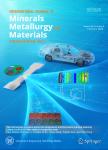Modeling of the effect of hydrogen injection on blast furnace operation and carbon dioxide emissions
作者机构:National Metallurgical Academy of UkraineDnipro 49005Ukraine
出 版 物:《International Journal of Minerals,Metallurgy and Materials》 (矿物冶金与材料学报(英文版))
年 卷 期:2022年第29卷第10期
页 面:1851-1861页
核心收录:
学科分类:080602[工学-钢铁冶金] 08[工学] 0806[工学-冶金工程]
主 题:hydrogen injection blast furnace zonal model carbon dioxide emissions
摘 要:The effect of hydrogen injection on blast furnace operation and carbon dioxide emissions was simulated using a 1D steady-state zonal *** maximum hydrogen injection rate was evaluated on the basis of the simulation of the vertical temperature pattern in the blast furnace with a focus on the thermal reserve *** effects of blast temperature and oxygen enrichment were also examined to estimate coke replacement ratio,productivity,hydrogen utilization efficiency,and carbon dioxide emission *** blast temperature of 1200℃,the maximum hydrogen injection rate was 19.0 and 28.3 kg of H_(2)/t of hot metal(HM)for oxygen enrichment of 2vol%and 12vol%,*** showed a coke replacement ratio of 3-4 kg of coke/kg of H_(2),direct CO_(2) emission reduction of 10.2%-17.8%,and increased productivity by up to 13.7%depending on oxygen enrichment *** blast temperature further reduced the direct CO_(2) *** utilization degree reached the maximum of 0.52-0.54 H_(2)O/(H_(2)O+H_(2)).The decarbonization potential of hydrogen injection was estimated in the range from 9.4 t of CO_(2)/t of H_(2) to 9.7 t of CO_(2)/t of H_(2).For economic feasibility,hydrogen injection requires revolutionary progress in terms of low-cost H_(2) generation unless the technological change is motivated by the carbon emission *** injection may unfavorably affect the radial temperature pattern of the raceway,which could be addressed by adopting appropriate injection techniques.



